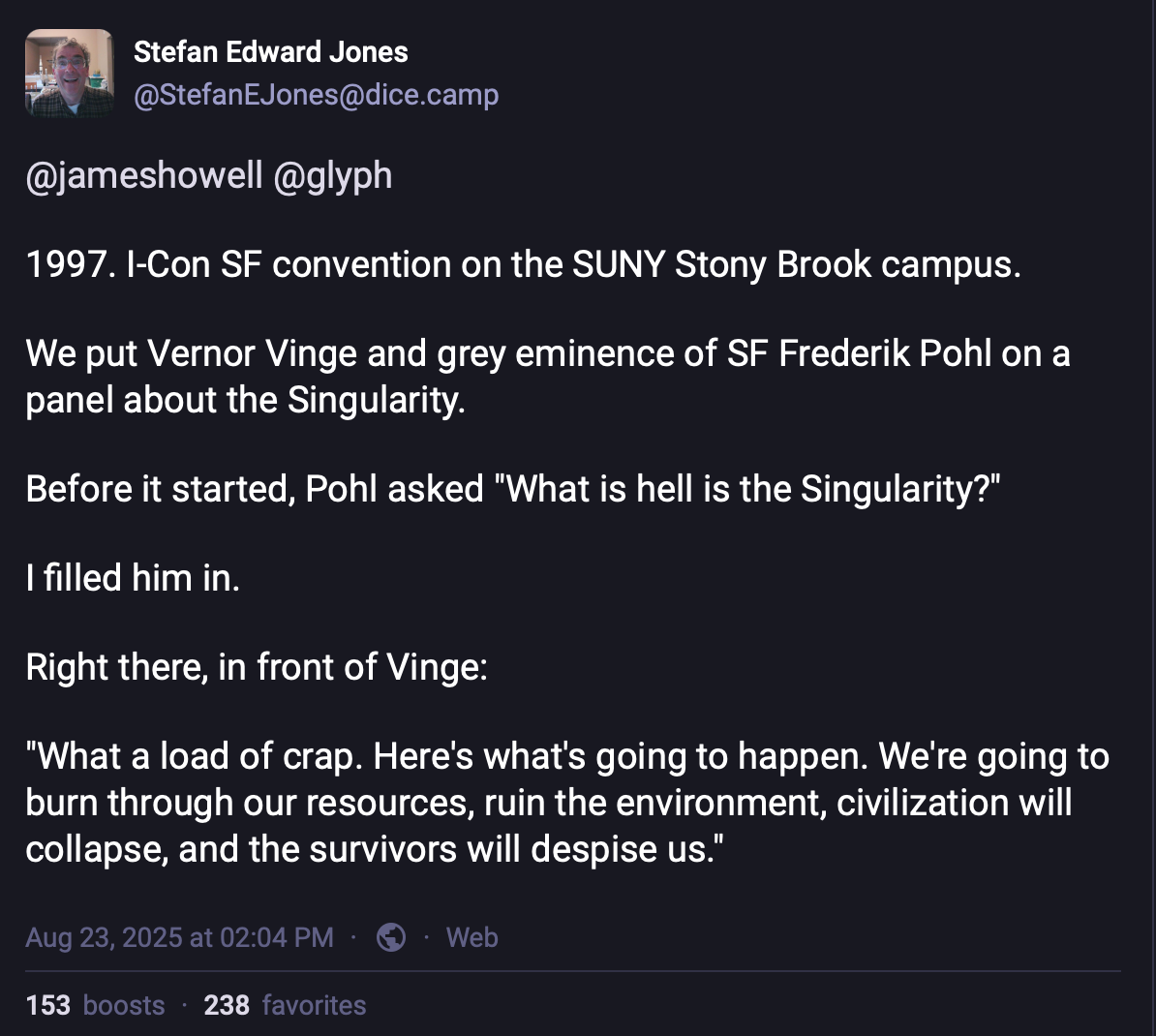I Know What You Did Last Summer

If you were to tell the story of the end of public education in the US, you wouldn't begin with the Trump Administration's bluster about closing the Department of Education. You wouldn't begin with Trump Administration policies at all – as awful and destructive as they are – and not simply because, as we are so often reminded, public education in the US is mostly a state, not federal, issue. What we are witnessing now – is it the end? – is obviously part of a much longer narrative arc, a much older push to privatize. This story of the end – some are rooting for it, you know, and there have been plenty of people who've been scheming and Milton-Friedman-ing for a good long while now – many of them in and around ed-tech.
No matter where you opt to launch your tale, I reckon it's likely the story will take the form of that classic Hemingway quip from The Sun Also Rises: "How do you go bankrupt?" "Two ways. Gradually, then suddenly." We like that formula (more than we like Hemingway, I dare say), perhaps because we recognize, as protagonists in our own stories, we aren't so good at paying attention until things become simply too dire to ignore. As Joni Mitchell put it, "Don't it always seem to go that you don't know what you've got 'til it's gone. Paved paradise. Put up a parking lot."
"Is Public Education Over?" Jennifer Berkshire asked in her newsletter this week, detailing a number of efforts across a number of states to push vouchers and private schools – that's the long-standing tactic of the "free market" folks – and to double-down on standardized testing and close "failing schools" – and that is the utterly dismal response of the Democrats' school reformers. "If you, like me, have been sounding the alarm about the dangers of school privatization," she writes, "it’s impossible to ignore the sense that the future we've been warning about has arrived." Indeed, and when it comes to the alarms I've been sounding, I'd add that the ed-tech crowd has always believed it could profit off of crisis, no matter which side here was triumphant: selling software, selling testing technology, selling "intelligent tutoring systems," selling "teacher-less" schools, extracting student data, selling student data, privatizing infrastructure, funding charter school networks and now hyping some microschool bullshit.
(In the latest back-to-school edition of Wired, Julia Black explores "How Microschools Became the Latest Tech Mogul Obsession." There's no mention of charter schools like Rocketship. There's no mention of AltSchool. So I do want to us to recognize, despite the latest! craze! framework that Wired loves to invoke: this new tech mogul obsession is an old tech mogul obsession. They just want to convince consumers (parents, politicians, journalists) that this is new and interesting, that this is different, that this time this time, their product will work magic.)

Today marks the 20th anniversary of Hurricane Katrina. If you were to tell the story of the end of public education in the US, you might start here – I think I would. Start with the subsequent takeover of the New Orleans public school system by charter school operators and the jubilance with which this was enacted (and is still talked about today). The dismantling of democratically-controlled institutions – this didn't begin with Trump.
The storm was the best thing that had happened to the education system in the city, Secretary of Education Arne Duncan would later pronounce, lauding the opportunities that "disaster capitalism" afforded. Almost 2000 people died in the storm, and education reformers like Duncan crowed because they could take leverage the tragedy and pursue their anti-union mission – "shock doctrine," as Naomi Klein put it. And plenty of folks are still cheering – in The Washington Post this week, we are told this was "a schools revolution unmatched anywhere for its radicalism and scale."
The firing of New Orleans' educators also marked "one of the largest displacements of Black educators since Brown v. Board of Education." The unemployment rate for Black women was 9.1% post-Katrina, incidentally. And with the firing of federal workers under Trump, unemployment for Black women has skyrocketed once again. It's a bad signal for the economy, so we're told. But all this is a bad signal for democracy.
The end of public schools. The end of democracy. They are intertwined.
People love to tell the story about the end of B. F. Skinner, thaT behaviorism were defeated – chased out of the field of psychology, erased from scientific relevance, made a mockery, rejected, forgotten, whatever – when Noam Chomsky wrote a very mean book review of Beyond Freedom and Dignity. (In some versions of the story, it was an earlier book review, in which Chomsky lambasted Verbal Behavior, that set all this scorn in motion.)
It's a weird story. I don't buy it, in part because I just don't believe that a book review (or Noam Chomsky, bless his heart) wields that much cultural power.
But mostly I don't buy it because behaviorism is still absolutely fucking everywhere, despite all the talk of a "cognitive turn." And while the promoters of "AI" like to talk about themselves as creating machines that mimic the mind – something that Skinner would surely laugh himself – these technologists are utterly beholden to behaviorism, to conditioning, to reinforcement learning.
In MIT Technology Review, Ben Crair makes the case for "Why we should thank pigeons for our AI breakthroughs." Poor birds. It's not their fault.
I wrote a little bit in Wednesday's newsletter about the fallout from the underwhelming launch of ChatGPT5 – about a small shift (maybe) towards more skepticism about "AI," about how we'll see "AI" evangelists start to sell their services with slightly different messaging. But I think I'll leave the gloating and "I told you so" to Gary Marcus, mostly because the harms from all this hype are ongoing, regardless of any proposed guardrails or policies or frameworks.
Kashmir Hill's story in The New York Times this week – "A Teen Was Suicidal. ChatGPT Was the Friend He Confided In" – is a case in point. And the story is probably one of the most upsetting things I've read in a while. And I read about this stuff for an living.
Adam Raine had started using ChatGPT for homework help; the technology offered him explicit guidance on how to take his life.

"Best learning technology invented to date," says one of the most powerful people in Silicon Valley. He's wrong. But it is, perhaps, the culmination of decades of behaviorial engineering and surveillance capitalism, the latest technology designed to capture and hold our attention – to nudge us and to monitor us and to hook us.
What are we doing?! What are we doing to children?!
Professors, professing: "Reclaiming Conversation in the Age of AI" by Sherry Turkle. "Human Literacy" by Eryk Salvaggio. "Shifting My Thinking about AI in the Classroom" by Michael Burns. "Yes, It Is Our Job As Professors To Stop Our Students Using ChatGPT" by Kate Manne. "Why We're Not Using AI in This Course, Despite Its Obvious Benefits" by Patrick Lin. "What Happened When I Tried to Replace Myself with ChatGPT in My English Classroom" by Piers Gelly. "College Students Have Already Changed Forever" by Ian Bogost. "Students Hate Them. Universities Need Them. The Only Real Solution to the A.I. Cheating Crisis" is the blue book, says Clay Shirky.
I'm only a chapter or so into R. F. Kuang's new novel Katabasis – two grad students travel to Hell to rescue their dissertation advisor – but damn, I can't help but quote her here:
Success in this field demanded a forceful, single-minded capacity for self-delusion.
Elsewhere on campus: "This Is the Group That's Been Swatting US Universities," says Wired. "Inside the Rise of OnlyFans on College Campuses," from Town and Country Magazine. Anthropic has released a report on how it says educators are using Claude, and the data will not surprise you. The New York Post boasts this "exclusive": "First lady Melania Trump will head effort to teach next generation about AI." Perfect. Honestly perfect. No notes.
"I am an AI Hater," writes Anthony Moser, "and I will not be polite. The machine is disgusting and we should break it. The people who build it are vapid shit-eating cannibals glorifying ignorance. I strongly feel that this is an insult to life itself."
And from Ed Zitron, ever prolix: "How to Argue with an AI Booster."

And finally, Rebecca Solnit on "Circuses vs. Roses: Notes on Pleasure and Scold Culture." That is to say, you can be absolutely enraged about the world, and you can be actively engaged in the struggle for human rights and climate justice, and you can spend some time looking at the pretty photos Travis Kelce and Taylor Swift posted to announce their engagement.
I have no strong feelings about these very wealthy and successful young people, but I do have strong feelings about people who tell us that flowers are bourgeois and we can't take pleasure in what we take pleasure in. Yes we can. And, I think, we must. As one of my favorite gospel songs puts it, "I won't let nobody steal my joy."
Thanks for reading! Please consider becoming a paid subscriber to Second Breakfast. Your financial support makes this work possible.





